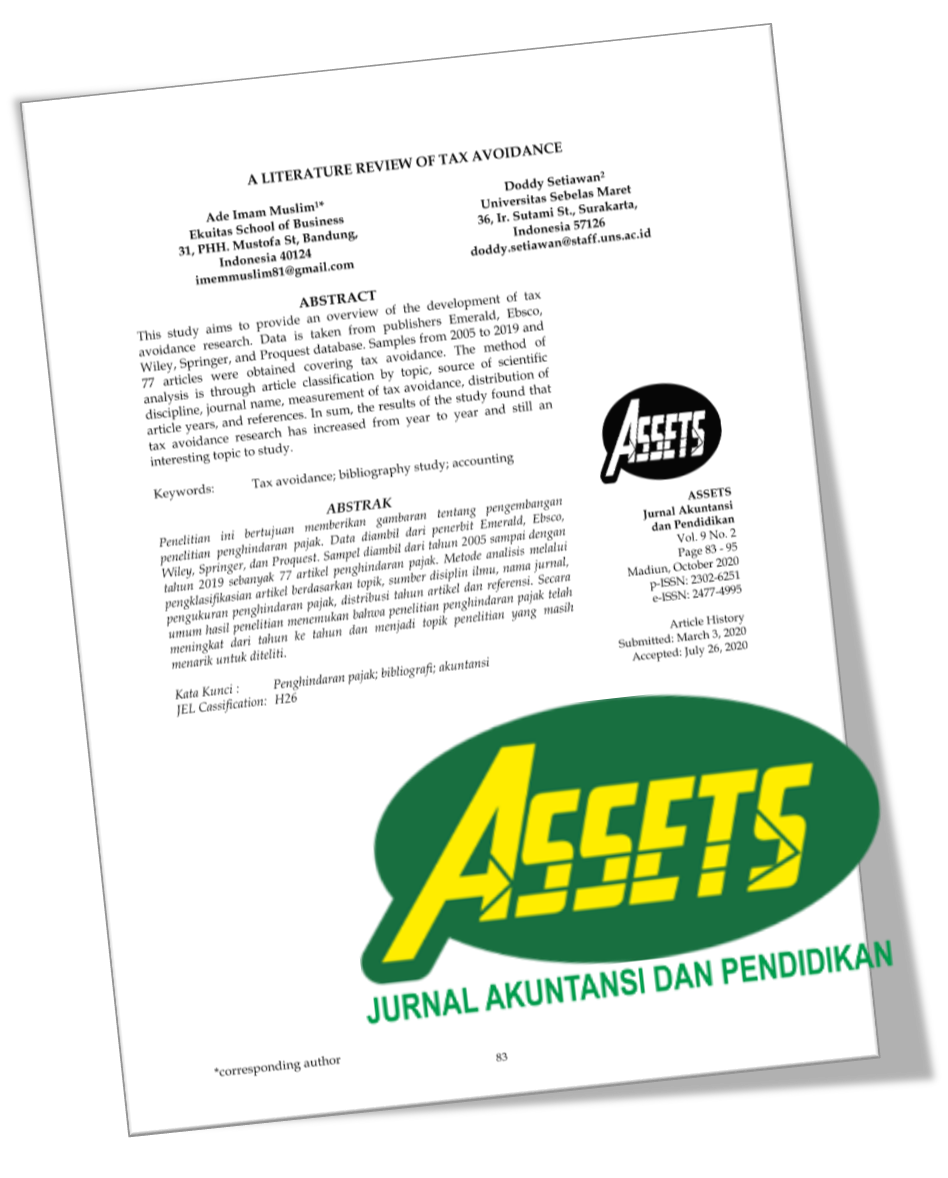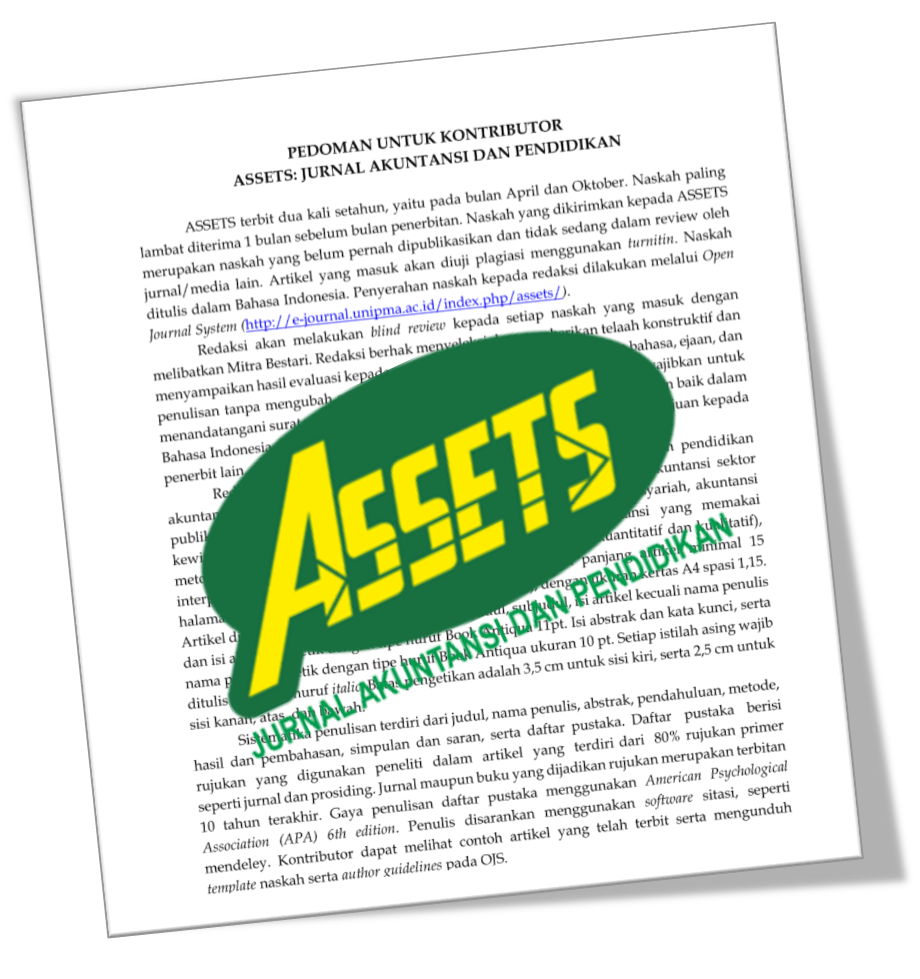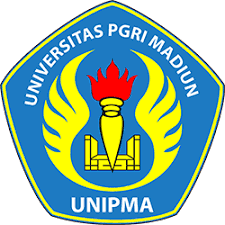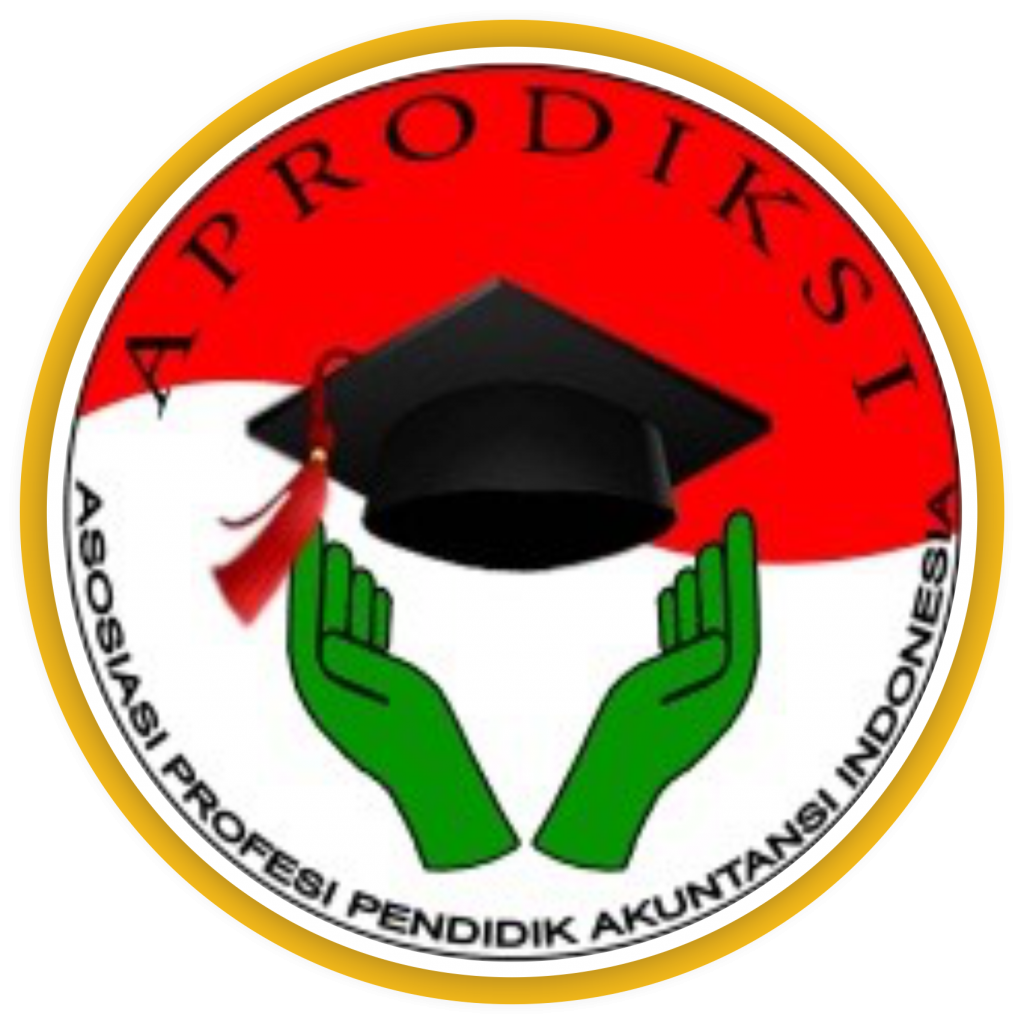SUSTAINABLE FINANCING ACCOUNTING : ASSITALLASSI CONCEPT
Abstract
ABSTRACT
This research constructs the concept of assitallassi (mutual support) applied by the patorani community for sustainable financing accounting. The research method used is a qualitative method with an interpretive paradigm. For the data collection, the researchers used two approaches simultaneously, namely institutional and ethno-methodological. The researchers chose qualitative data and obtained data directly from the field (primary data) as research data. Accounting practice begins with recording the funding and profit-sharing of the catch during a season. The important conclusion of this research is that accounting is related to material and no material aspects. The accounting system for financing and profit-sharing in the community of Patorani is not absolute but tailored to needs. It all depends on the agreement of all parties during the assikko' kana (hybrid contract).
ABSTRAK
Penelitian ini mengkonstruksi konsep assitallassi (Saling menghidupi) yang diterapkan oleh komunitas patorani untuk akuntansi pembiayaan berkelanjutan. Metode penelitian yang digunakan adalah metode kualitatif dengan paradigma interpretif. Untuk perolehan data, peneliti menggunakan dua pendekatan sekaligus yaitu institusional dan etnometodologi. Peneliti memilih data kualitatif dan perolehan data secara langsung diambil dari lapangan (data primer) sebagai data penelitian. Praktek akuntansi dimulai dari mencatat pembiayaan dan bagi hasil atas hasil tangkapan selama satu musim. Temuan penting dalam penelitian ini yaitu akuntansi tidak hanya terkait dengan materi tetapi aspek non materi. sistem akuntansi pembiayaan dan bagi hasil pada komunitas patorani tidak bersifat mutlak tetapi disesuaikan dengan kebutuhan. Semua tergantung kesepakatan semua pihak ketika assikko’ kana (hybrid contract).
Keywords
Full Text:
PDFReferences
Albi, A. J. S. (2018). Metodologi penelitian kualitatif. Sukabumi: CV Jejak (Jejak Publisher).
Burell, G., & Morgan, G. (1979). Sociological Paradigms and Organizational Analysis (First Edit). London: British Library Cataloging In Publication Data.
Cresswell, J. W. (2014). Research design. Qualitative, quantitative, and mixed methods approach. In Research design Qualitative quantitative and mixed methods approaches (p. 398). Califonia: Sage.
Dequech, D. (2015). Old and New Institutionalism in Economics. In International Encyclopedia of the Social & Behavioral Sciences: Second Edition, 17. Elsevier. https://doi.org/10.1016/B978-0-08-097086-8.71070-1.
DiMaggio, P. J., & Powell, W. W.. (1991). The New Institutionalism in Organizational Analysis. Chicago: the University Of Chicago Press, Ltd.
Fogarty, T. J. (1993). Financial accounting standard-setting as an institutionalized action field: Constraints, opportunities, and dilemmas. Journal of Accounting and Public Policy, 11(4), 331–355. https://doi.org/http://dx.doi.org/10.1016/0278-4254(92)90003-G
Garfinkel, Harold. (1967). Studies in Ethnomethodology (pp. 1–152). New Jersey: Prentice-Hall, Inc.
Gray, S. J. (1988). Towards a theory of cultural influence on the development of accounting systems internationally. Abacus, 24(1), 1-15.
Hofstede, G. (1986). Culture’s consequences: International differences in work-related values. London: Sage.
Holstein, J. A., & Gubrium, J. F. (2009). Fenomenologi, etnometodologi, dan praktik interpretif. Dalam N. K. Denzin, Y. S. Lincoln, & S. Z. Qudsy (Penyunt.), Handbook of Qualitative Research (Dariyatno, B. S. Fata, Abi, & J. Rinaldi, Penerj). Yogyakarta: Pustaka Pelajar.
Ismail, R. (2009). Metode Penelitian Kualitatif (Pertama). USU Press : Medan - Indonesia
Jackson, W. A. (2009). Economics, Culture, and Social Theory. Cheltenham – UK: Edward Elgar Publishing Limited.
Jalbert, P. L. (1999). Media studies : ethnomethodological approaches. In Studies in ethnomethodology and conversation analysis (Issue 5). New York: University Press of America Inc.
Jayasinghe, K., & Thomas, D. (2009). The preservation of indigenous accounting systems in a subaltern community. Accounting, Auditing & Accountability Journal, 22(3), 351-378.
Jeacle, I. (2009). Accounting and everyday life: towards a cultural context for accounting research. In Qualitative Research in Accounting & Management, 6 (3).
Lawrence, T. B., Winn, M. I., & Jennings, P. D. (2001). The Temporal Dynamics of Institutionalization. The Academy of Management Review, Vol. 26(4), 624-644.
Liberman, K. (2013). More Studies In Ethnomethodology. Library of Congress Cataloging-in-Publication Data. New York: State University Of New York Press.
Mamik. (2015). Metodologi Kualitatif (M. K. M., Dr.Chaoiroel Anwar, SKM. (ed.); Cetakan Pe). Sidoarjo: Zifatama Jawara.
Manzilati, A. (2017). Metodologi Penelitian Kualitatif: Paradigma, Metode, dan Aplikasi. Malang: Universitas Brawijaya Press.
Meyer, J. W., & Rowan, B. (1977). Institutionalized Organizations: Formal Structure as Myth and Ceremony. American Journal of Sociology, 83(2), 340–363.
Napier, C. J. (2006). Accounts of change: 30 years of historical accounting research. Accounting, Organizations and Society, 31, 445–507.
Polomo, M. (2000). Sosiologi Kontemporer. Jakarta: PT. Raja Grafindo Persada.
Rahardjo, M. (2018). Apa itu studi etnometodologi ? http://repository.uin-malang.ac.id/2435/1/2435.pdf
Rahayu, S. (2015). Penganggaran dana Bantuan Operasional Sekolah (Perspektif New Institusional Sociology). Disertasi, Universitas Brawijaya. Malang.
Ritzer, G. (2011). Sociological Theory, Edisi Kesembilan. Jakarta: PT. Raja Grafindo Persada.
Rukin, D. S. P. M. S. (2019). Metodologi Penelitian Kualitatif, Cetakan Pertama. Takalar: Yayasan Ahmar Cendekia Indonesia.
Scott, W. R. (2003). Organizations : rational, natural, and open systems, Edition Third. NewJersey: Prentice-Hall.
Scott, W. R. (1995). Institutions and Organizations. Califonia: Sage Publication.
Semiawan, P. D. C. R. (2010). Metode Penelitian Kualitatif. Jakarta: Grasindo.
Siti-Nabiha, A. K., & Scapens, R. W. (2005). Stability and change: an institutionalist study of management accounting change. Accounting, Auditing & Accountability Journal, 18(1), 44–73. https://doi.org/10.1108/09513570510584656
Sudarwan, M., & Fogarty, T. J. (1996). Culture and accounting in Indonesia: An empirical examination. The International Journal of Accounting, 31(4), Hal. 463-481.
Sukidin, B. (2002). Metode Penelitian Kualitatif Perspektif Mikro, Editor Rahma, Edisi Pertama. Surabaya: Penerbit Ihsan Cendekia.
Sukoharsono, E. G. (2014). Paradigm and Postmodern Accounting Research : An Imaginary Dialogue. Centro Multi Akuntansi Ubaidillah Malik, Vol. 3. http://multiparadigma.lecture.ub.ac.id/paradigm-and-postmodern-accounting-research-an-imaginary-dialogue/
Susilo, D. (2017). Etnometodologi Sebagai Pendekatan Baru dalam Kajian Ilmu Komunikasi. Jurnal Studi Komunikasi, 1(March), 62–72.
Suwendra, I. W. (2018). Metodologi Penelitian Kualitatif dalam Ilmu Sosial, Pendidikan, Kebudayaan dan Keagamaan. Badung: Nilacakra.
Tinker, T. (1985). Paper Prophets : A Social Critique Of Accounting. New York: Praeger Publisers.
Tricker, R. I. (1979). Research in Accounting - Purpose, Process, and Potential. Accounting and Business Research, 10(37), 3-15.
Tsui, J. S. (2001). The impact of culture on the relationship between budgetary participation, management accounting systems, and managerial performance: An analysis of Chinese and Western managers. The International Journal of Accounting, 36(2), 125-146. https://doi.org/10.1016/S0020-7063(01)00101-7
Willis, J. W. (2007). Foundation Of Qualitative Research. Califonia: Sage Publication.
Yusuf, J., Rukmana, D., Ali, S. A., & Indar, Y. N. (2014). Studi Kelembagaan Dalam Pengelolaan Dan Pemanfaatan Telur Ikan Terbang (Kasus Desa Pa’ Lalakang Kabupaten Takalar), Jurnal Ilmu Kelautan Dan Perikanan, 24(3), 19-28.
Zucker, L. G. (1977). The Role of Institutionalization in Cultural Persistence. American Sociological Review, 42(5), 726-743.
Article Metrics
Abstract has been read : 1031 timesPDF file viewed/downloaded: 0 times
DOI: http://doi.org/10.25273/jap.v10i1.8592
Refbacks
- There are currently no refbacks.
Copyright (c) 2021 Sultan Syah

This work is licensed under a Creative Commons Attribution-ShareAlike 4.0 International License.
ASSETS: Jurnal Akuntansi dan Pendidikan is supported by
ASSETS: Jurnal Akuntansi dan Pendidikan is indexed by
| | | ||||
| | | | |

ASSETS: Jurnal Akuntansi dan Pendidikan is licensed under a Creative Commons Attribution-ShareAlike 4.0 International License.











